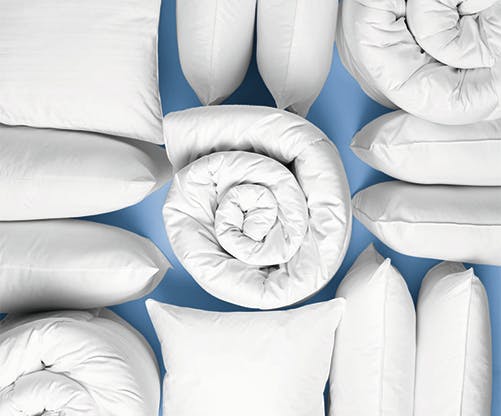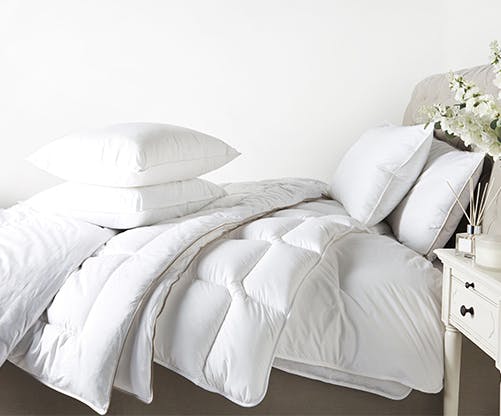How To Wash & Care For Your Bedding
The average person spends around 35% of their life sleeping, which means a whole third of your life is taken up lying under a duvet and on top of your sheets and pillow. That’s a lot of snoozing! It’s essential to regularly wash your bedding including your duvets and pillows, but almost a quarter of people have never even thought to wash their duvet and a third of people haven’t replaced their bedding in over a decade.
But just how often should you be washing your bedding? Well, the recommended guidelines for all your bed linens, pillows, duvets and bedding protection are:
Bed linen – once a week
Your linens make direct contact with your skin each night that you sleep in them and are the bedding item you should be washing most regularly. Bed sheets can collect a serious amount of sweat, body oils, saliva and dirt, which cause nasty bacteria, and if not washed enough can transfer more quickly through to your pillows and mattress. The dead skin cells that you shed every night can also attract dust mites which can cause allergic reactions and affect breathing in people with asthma. Washing your linens each week is ideal, but if this isn’t doable you should be making an effort to clean them at least every two weeks.
Duvets, pillows and bedding protection – every six months
It’s recommended that you wash your duvet, pillows and bedding protection twice a year, which is probably a shock to some who never bother at all. When it comes to cleaning them, carefully follow the care label instructions. Cotton, down and synthetic duvets and pillows can normally be machine washed, however foam pillows need to be gently hand washed. Something you may not know is that when washing bedding, you only need to use a small amount of detergent – almost a third of what you’d use for a normal laundry load. Professional dry cleaning may be a better option (bedding can be too bulky for some domestic washing machines) but always ensure that they are well aired after to get rid of any residual chemical scents.
Top Tip: To avoid any snagging of the filling, place your pillows inside a pillowcase when washing.
So now you know how often you should be washing your different bedding items, how can you care for them and ideally make them last longer?
Synthetic Fibres
Duvets and pillows with synthetic fillings can usually be washed at home in a conventional washing machine, however some machines don’t have the capacity to allow the duvet to move around as freely so may need to be taken to a launderette.
If your synthetic duvet fits, use a gentle cycle on a normal spin setting for minimum agitation to the filling and wash on the highest temperature allowed according to the care label to kill off any bacteria. After the cycle, shake out the duvet while it’s damp to redistribute the filling evenly and let it dry and air out completely before using it again, to avoid growth of mould and mildew. For this you can use a tumble drier for 45 minutes (if the care label states that this is safe), hang it outside on a sunny day, or place over a radiator on cold and wet days.
Natural Fibres
If your duvet or pillows are filled with feather or down they aren’t usually machine washable, so you may have to take them to a specialist for cleaning. However, if you’ve checked the care label and your bedding is machine washable, put them on a gentle cycle and use a detergent without enzymes. After washing, it’s essential that a natural filling is completely air-dried before use. Although the cover may feel dry to touch, the filling often holds on to moisture, and if it isn’t dried thoroughly all the way through, the damp filling can rot over time.
100% Cotton
Fabric softeners or conditioners aren’t always necessary, as cotton sheets are soft in the first place. Try to wash 100% cotton bedding once a month without fabric conditioners, as it will help the cotton maintain a like-new feel for longer.
To avoid creases in your cotton bedding, you can’t beat drying sheets on a washing line. The natural weight will remove the majority of the creases, and the slower drying process from the wind and sun will stop the cotton from completely drying out. If you have no choice and you need to use the tumble drier, make sure to use the lowest setting to dry them over a longer period without the use of excessive heat.
If ironing is needed, use quick, long strokes up and down the ironing board to get rid of the creases more effectively, and don’t have your iron too hot or leave it on one part of the sheet for too long.
SHOP 100% COTTON
And if you want an extra-easy life: The Perfectly Washable Range
Want to be able to wash your bedding regularly without the worry of damaging it? Dunelm’s Perfectly Washable range loves taking a spin in the washing machine and is designed to be washed at home again and again. Soft, light and cosy, this non-allergenic range includes a duvet, pillow pair, mattress protector and pillow protector pair crafted from a high quality polycotton blend which helps to keep the shape after washing. The siliconised filling stops the fibres sticking together in the wash, which helped this market leading bedding get the Good Housekeeping Institute stamp of approval.
Bedding Protection
Bedding protectors are great for prolonging the life of your bedding, as well as enhancing sleep. Pillow protectors, duvet protectors and mattress protectors provide added comfort and many options include special materials, treatments and designs to make your bedding more breathable and anti-allergenic, cooling, warm or even spill-proof and water resistant depending on your needs.
SHOP BEDDING PROTECTION


